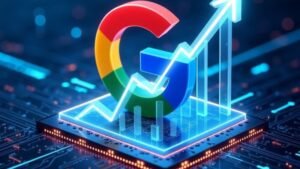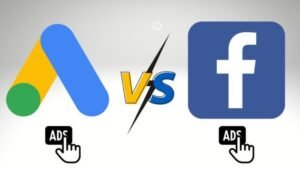Facebook Ads vs Google Ads: Which One Should You Choose for Your Business?
Digital advertising has become one of the most powerful ways for businesses to reach their target audience. With billions of users online every day, brands can no longer rely solely on traditional marketing channels to generate leads or sales. Among the most effective platforms for paid digital advertising, Facebook Ads and Google Ads stand out as the two giants. Both platforms dominate the advertising industry, but they work differently, cater to different goals, and provide unique advantages.
In this blog, we will dive deep into Facebook Ads vs Google Ads, explore their strengths, differences, costs, targeting options, industry use cases, and help you decide which platform is the right choice for your business.
What Are Facebook Ads?

Facebook Ads are paid advertisements that run across Facebook and its family of apps, including Instagram, Messenger, and Audience Network. Businesses can create highly targeted campaigns to reach specific audiences based on demographics, interests, behaviors, and even life events.
For example, a fitness trainer can run Facebook Ads targeting users aged 20–35 who are interested in gyms, workout routines, or healthy eating. This hyper-targeted approach allows brands to deliver personalized ads that resonate with their audience.
Facebook Ads are especially popular for:
- Building brand awareness
- Generating leads through forms
- Driving engagement on posts
- Boosting website traffic
- Selling products via dynamic product ads
Another major benefit of Facebook Ads is the ability to integrate storytelling into campaigns. Unlike search ads that are short and text-heavy, Facebook Ads can include rich visuals, lifestyle videos, testimonials, and carousels that build emotional connections with users. For businesses that rely heavily on branding, such as fashion, lifestyle, and fitness industries, this feature becomes a game changer.
What Are Google Ads?

Google Ads (formerly Google AdWords) is Google’s online advertising platform that allows businesses to show ads across Google Search, YouTube, and its Display Network. It’s based on a pay-per-click (PPC) model, where advertisers bid on keywords relevant to their business.
For example, if someone searches for “best digital marketing agency near me,” agencies can bid on that keyword to appear at the top of Google search results. This makes Google Ads one of the most effective platforms for capturing demand — people already searching for solutions are more likely to convert into customers.
Google Ads are highly effective for:
- Capturing high-intent search traffic
- Driving e-commerce sales
- Promoting local businesses
- Running video campaigns on YouTube
- Retargeting visitors across Google’s network
What makes Google Ads powerful is the timing — it catches users at the exact moment they’re looking for a solution. For service-based businesses like lawyers, real estate agents, or healthcare providers, this feature provides one of the highest returns on investment.
Facebook Ads vs Google Ads: Key Differences
While both platforms drive results, they operate differently. Here are the major differences:
1. User Intent
- Google Ads: Focuses on capturing existing demand. People search for what they need, so ads appear when intent is high.
- Facebook Ads: Creates demand by showing ads to users who may not be actively searching but are likely to be interested.
2. Targeting Options
- Google Ads: Targets based on keywords, search queries, location, and intent.
- Facebook Ads: Targets based on demographics, interests, behaviors, and custom/lookalike audiences.
3. Ad Formats
- Google Ads: Search ads, display ads, shopping ads, and YouTube video ads.
- Facebook Ads: Image ads, video ads, carousel ads, story ads, lead forms, and catalog sales.
4. Cost
- Google Ads: Average cost-per-click (CPC) ranges from $1–$5, depending on the industry. Competitive niches like finance or law can exceed $50 per click.
- Facebook Ads: Average CPC is usually lower, around $0.50–$2.00, making it cost-effective for awareness and engagement campaigns.
5. Best For
- Google Ads: Businesses wanting quick conversions and sales from high-intent users.
- Facebook Ads: Businesses aiming for awareness, engagement, and audience building.
Advantages of Facebook Ads
- Highly Advanced Targeting – Facebook lets you target users by age, gender, location, interests, income, and even behaviors like travel history or shopping patterns.
- Visual Storytelling – Creative ad formats like videos, carousels, and stories allow brands to showcase their personality.
- Large User Base – With over 3 billion monthly active users across Meta platforms, Facebook Ads provide massive reach.
- Affordable for Small Businesses – Facebook Ads are budget-friendly and can work even with $5–10 per day.
- Great for Retargeting – Custom audiences let you retarget website visitors or app users.
👉 Extra Point: Facebook Ads excel at building communities. Unlike Google Ads, where the interaction ends at a click or conversion, Facebook fosters ongoing engagement through likes, shares, and comments, creating long-term brand loyalty.
Advantages of Google Ads
- High Intent Audience – Users searching for a product/service are more likely to convert.
- Wide Reach Across Google Ecosystem – Includes Google Search, YouTube, Gmail, and Display Network.
- Flexible Budget Control – You can set daily budgets, maximum bids, and optimize costs effectively.
- Detailed Performance Tracking – With Google Analytics, you can measure conversions, clicks, and ROI precisely.
- Scalable for Any Business Size – Works for local shops, e-commerce stores, and large enterprises alike.
👉 Extra Point: Google Ads also supports call-only campaigns, which are especially useful for service providers like electricians, plumbers, or doctors who want direct phone inquiries rather than website visits.
Facebook Ads vs Google Ads: Which Is More Cost-Effective

marketing strategThe cost-effectiveness depends on your business goals.
Facebook Ads are generally cheaper per click and are excellent for awareness campaigns, lead generation, and building relationships.
Google Ads can be more expensive but often bring higher-quality leads with stronger purchase intent.
For example:
A local bakery may find better ROI on Facebook Ads by targeting nearby customers with attractive images.
A law firm may prefer Google Ads since potential clients actively search for “divorce lawyer near me.”
👉 To evaluate cost-effectiveness, businesses should consider Customer Lifetime Value (CLV). If one customer is worth $2,000, spending $50 per click on Google Ads may still be profitable. But if you sell a $20 product, Facebook Ads might be the smarter choice.
Case Studies: Real-World Examples
Example 1: E-commerce Store
An online clothing store used Facebook Ads to run dynamic retargeting campaigns. Shoppers who viewed a product but didn’t buy were shown carousel ads with discounts. Result: 35% increase in conversions.
Example 2: Local Service Business
A plumbing company ran Google Ads targeting “emergency plumber near me.” Since searchers had urgent intent, the company received calls within hours, leading to immediate bookings.
Example 3: SaaS Startup
A SaaS company combined both platforms. They used Facebook Ads to generate awareness with explainer videos and Google Ads to capture people searching for “best project management tool.” The hybrid strategy helped them cut acquisition costs by 27%.
Mistakes to Avoid in Facebook Ads and Google Ads
Targeting Everyone – Narrow targeting always works better.
Ignoring Negative Keywords in Google Ads – Without them, you’ll waste money on irrelevant searches.
Poor Ad Creative on Facebook – Low-quality visuals get ignored.
Not Using Retargeting – Both platforms allow retargeting, but many businesses underutilize it.
Failing to Test and Optimize – A/B testing is essential for improving ROI.
How to Pick Between Facebook and Google Ads
When choosing between Facebook Ads vs Google Ads, ask yourself:
What is my primary goal?
Awareness & engagement → Facebook
Immediate leads & sales → Google
Who is my audience?
Younger, social-driven → Facebook
High-intent searchers → Google
What is my budget?
Small budgets → Facebook Ads may stretch further
Higher budgets → Google Ads bring higher conversion potential
👉 Pro Tip: Always run small test campaigns on both platforms before committing a larger budget. Data-driven decisions outperform assumptions.
Combining Facebook Ads and Google Ads
The truth is, you don’t always have to choose one. The most successful brands use both platforms together.
Stage 1: Awareness with Facebook Ads – Run social campaigns to introduce your brand.
Stage 2: Intent with Google Ads – Capture people who later search for your brand/product.
Stage 3: Retargeting on Both – Retarget interested users on Facebook and Google Display Network.
This full-funnel approach maximizes ROI and ensures you don’t lose potential customers at any stage.
Future of Facebook Ads and Google Ads
As technology evolves, both platforms are introducing AI-driven advertising.
Facebook Ads now uses AI for automated placements, budget optimization, and predictive targeting.
Google Ads leverages AI-powered tools like Performance Max campaigns, Smart Bidding, and predictive analytics.
We can expect:
More automation in ad optimization
Increased competition, raising ad costs
Greater personalization through machine learning
Expansion of video-first ad formats
Conclusion
The debate of Facebook Ads vs Google Ads doesn’t have a one-size-fits-all answer. Both platforms are powerful, but their effectiveness depends on your business type, goals, and budget.
If you want to build awareness, reach new audiences, and create demand, Facebook Ads are a great choice.
If you want to capture high-intent customers and drive immediate sales, Google Ads will deliver faster results.
For maximum growth, a combined strategy using both platforms often provides the best ROI.
In the end, the smartest move is to test, measure, and optimize. Every business is different — but by understanding the strengths of Facebook Ads vs Google Ads, you can create a winning digital that drives results